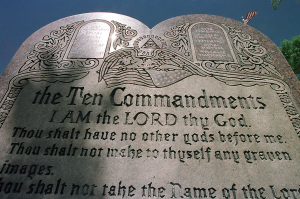ADF Memo: Schools Can Talk About Easter Biblically, Legally
A Christian-based legal defense alliance wants to make sure everyone understands that schools in the U.S. may talk about Easter in the historical sense of what is written in the Bible about the time of Jesus' crucifixion and resurrection – not just about chocolate Easter bunnies.
The Alliance Defense Fund published a memorandum last week which states that courts have long held that it is permissible to objectively discuss the different holidays (including Easter) that are celebrated and what their meaning is to those who celebrate them.
ADF Senior Legal Counsel David Cortman wrote in a blog posted last week – titled "Easter: Bunny or Jesus?" –that simply talking about Jesus does not violate the "so-called separation of church and state."
"Easter brings different thoughts and holds different meanings to different people," Cortman stated. "Some think first of that chocolate Easter bunny that you may get (if you've been good, maybe it will even be solid chocolate and not just that thin outer shell with nothing inside but air). Or those marshmallow peeps (my kids love those). Or the Cadbury eggs. But to many, Easter is first and foremost about the resurrection of our Lord Jesus Christ. Arguably the most important day in Christendom."
Historically, students and teachers in America have freely celebrated holidays like Easter and Christmas by decorating classroom bulletin boards, learning traditional songs, and exchanging cards and gifts with classmates, ADF stated in its memo.
"In recent years, certain groups opposed to public religious expression have spread misconceptions – through fear, intimidation, and disinformation – about the legalities of celebrating these holidays in public schools," the officials at ADF continued. "As a result, many school officials have removed nearly all religious references to Easter and replaced them with secular symbols.
"While many do so unknowingly, school officials have begun a new 'tradition' of violating the constitutional rights of students and teachers to seasonal religious expression in our public school system. Our Constitution acknowledges that people of faith have a right to openly express their beliefs in the public square. But many school officials attempt to prohibit students and teachers from expressing any religious aspect of Easter."
While the so-called "War on Christmas" dominates mass media coverage in the area of religious expression in the public square during the Christian holiday, the discussion around Easter is more subdued, although still evident.
"The courts have long held that it is permissible to objectively discuss the different holidays that are celebrated and what their meaning is to those who celebrate them," Cortman asserted. "Schools may permit their teachers to teach about what Easter represents to Christians, and even – hold on to your hat – read from the Bible when doing so.
"In spite of what the ACLU and its allies would have you believe, this is constitutionally permissible. And this holds true for any holiday: Christmas, Easter, Thanksgiving, etc."
The Constitution Protects Religious Speech in Public Schools
"The First Amendment to the United States Constitution says 'Congress shall make no law respecting the establishment of religion, or prohibiting the free exercise thereof; or abridging the freedom of speech…' This Amendment restricts the government's ability to suppress speech and expressive activity – including religious expression. No court has ever ruled that the Constitution demands school officials to censor Easter songs, eliminate all references to Easter, or silence those who celebrate Easter," ADF stated in its memo.
The nearly 8-page memo also includes the group's argument that students have a constitutional right to express their faith and religious ideas in a public school. The First Amendment protects the private religious speech of students both on and off the school campus. The Supreme Court has stated that a student's free speech rights apply "when [they are] in the cafeteria, or on the playing field, or on the campus during the authorized hours."
Cortman concluded his post by making the case that talking about Easter by way of the holiday's biblical context is "not only legally permitted, it is educationally sound."
"How can we expect our children to understand our culture, our history, without teaching them the religious aspects? There is no doubt that our country has a great religious heritage," he wrote. "Regardless of how groups on the left try to rewrite history and ignore this, it remains in our literature, our pop culture, our monuments, and our buildings.
"Unless we are to whitewash all of this (which would certainly please our leftist friends), we must teach our children where we came from, along with the underpinnings of all our freedoms. It has been said that if we don't know where we came from, we certainly won't know where we are heading. Just look around, this seems true for our country now more than ever."
The entire ADF memo "Constitutional Rights of Students, Teachers, and Public Schools to Seasonal Religious Expression" can be read on a PDF file here: http://www.alliancedefensefund.org/Content/pdf/2012_Easter_Memo.pdf





























